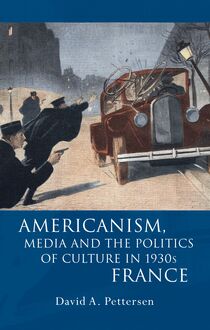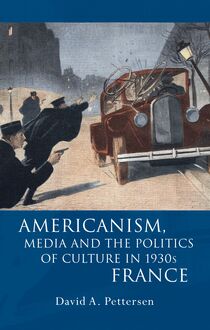-
 Univers
Univers
-
 Ebooks
Ebooks
-
 Livres audio
Livres audio
-
 Presse
Presse
-
 Podcasts
Podcasts
-
 BD
BD
-
 Documents
Documents
-
- Cours
- Révisions
- Ressources pédagogiques
- Sciences de l’éducation
- Manuels scolaires
- Langues
- Travaux de classe
- Annales de BEP
- Etudes supérieures
- Maternelle et primaire
- Fiches de lecture
- Orientation scolaire
- Méthodologie
- Corrigés de devoir
- Annales d’examens et concours
- Annales du bac
- Annales du brevet
- Rapports de stage
La lecture à portée de main
Vous pourrez modifier la taille du texte de cet ouvrage
Découvre YouScribe en t'inscrivant gratuitement
Je m'inscrisDécouvre YouScribe en t'inscrivant gratuitement
Je m'inscrisEn savoir plus
Vous pourrez modifier la taille du texte de cet ouvrage
En savoir plus

Description
Who has not, in a favored moment, ‘stolen the limelight’, whether inadvertently or by design? The implications of such an act of display – its illicitness, its verve, its vertiginous reversal of power, its subversiveness – are explored in this book. Narrative crafting and management of such scenarios are studied across canonical novels by Gide, Colette, Mauriac, and Duras, as well as by African Francophone writer Oyono and detective novelist Japrisot. As manipulated within narrative, acts of display position a viewer or reader from whom response (from veneration or desire to repugnance or horror) is solicited; but this study demonstrates that display can also work subversively, destabilising and displacing such a privileged spectator. As strategies of displacement, these scenarios ultimately neutralise and even occult the very subject they so energetically appear to solicit. Powered by gendered tensions, this dynamic of display as displacement works toward purposes of struggle, resistance or repression.
Preface
Introduction
Part I: Embodied Display and Effects of Displacement
Ch. 1: Staging the Hyperfeminine: Colette
Ch. 2: ‘Stripped Naked’: Dismantling Gender in Oyono’s Une vie de boy
Ch. 3: Disappearance as Display: Beyond the Strait Gate in Gide
Part II: Narrating Display, Narrating Displacement
Ch. 4: Framing Monstrosity in Mauriac’s Thérèse Desqueyroux: ‘Buried Hearts’ and ‘Filthy Bodies’
Ch. 5: ‘Girl Stuff’: Genre, Masquerade and Displacement in Japrisot’s Piège Pour Cendrillon
Ch. 6: Spectacular Scripts: Transgendering the Mad Mother in Duras’s Different Lover(s)
Conclusion
Bibliography
Sujets
Informations
| Publié par | University of Wales Press |
| Date de parution | 15 mai 2022 |
| Nombre de lectures | 0 |
| EAN13 | 9781786838629 |
| Langue | English |
Informations légales : prix de location à la page 0,4100€. Cette information est donnée uniquement à titre indicatif conformément à la législation en vigueur.
Extrait
FRENCH AND FRANCOPHONE STUDIES
Stolen Limelight
Series Editors
Hanna Diamond (Cardiff University)
Claire Gorrara (Cardiff University)
Editorial Board
Ronan le Coadic (Universit Rennes 2)
Colin Davis (Royal Holloway, University of London)
Didier Francfort (Universit Nancy 2)
Sharif Gemie (University of South Wales)
H. R. Kedward (Sussex University)
Margaret Majumdar (University of Portsmouth)
Nicholas Parsons (Cardiff University)
Max Silverman (University of Leeds)
Also in Series
Audrey Evrard, Precarious Sociality, Ethics and Politics: French Documentary Cinema in the Early Twenty-First Century (2022)
Amaleena Daml and Gill Rye (eds), Women s Writing in Twenty-First-Century France: Life as Literature (2013)
Fiona Barclay (ed.), France s Colonial Legacies: Memory, Identity and Narrative (2013)
Jonathan Ervine, Cinema and the Republic: Filming on the margins in contemporary France (2013)
Kate Griffiths and Andrew Watts, Adapting Nineteenth-Century France: Literature in Film, Theatre, Television, Radio and Print (2013)
Ceri Morgan, Mindscapes of Montr al: Qu bec s urban novel, 1950-2005 (2012)
Margaret E. Gray, 2022
All rights reserved. No part of this book may be reproduced in any material form (including photocopying or storing it in any medium by electronic means and whether or not transiently or incidentally to some other use of this publication) without the written permission of the copyright owner except in accordance with the provisions of the Copyright, Designs and Patents Act 1988. Applications for the copyright owner s written permission to reproduce any part of this publication should be addressed to The University of Wales Press, University Registry, King Edward VII Avenue, Cardiff CF10 3NS.
www.uwp.co.uk
British Library Cataloguing-in-Publication Data
A catalogue record for this book is available from the British Library.
ISBN 978-1-78683-860-5
eISBN 978-1-78683-862-9
The right of Margaret E. Gray to be identified as author of this work has been asserted in accordance with sections 77, 78 and 79 of the Copyright, Designs and Patents Act 1988.
Front Cover: Larry Rivers (1923-2002) VAGA @ ARS, NY. I Like Olympia in Blackface, 1970. Oil on wood, plastic, plexiglas. 182 x 194 x 170 cm. AM 1976-1231. Photograph: Philippe Migeat. Mus e National d'Art Moderne, Centre Georges Pompidou, Paris, France. Digital image copyright CNAC/MNAM, Dist. RMN Grand-Palais/Art Resource, NY.
The publisher has no responsibility for the persistence or accuracy of URLs for any external or third-party internet websites referred to in this book, and does not guarantee that any content on such websites is, or will remain, accurate or appropriate.
For Off-the-Deep-End Oz,
with whom it all began
For Joseph and Nathan,
with whom it almost ended
And in memory of my mother
Hazel Ward Burton Gray
1931-2020
Contents
Preface
Introduction
Part I:
Embodied Display and Effects of Displacement
Chapter 1 Staging the Hyperfeminine: Colette
Chapter 2 Stripped Naked : Dismantling Gender in Oyono s Une vie de boy
Chapter 3 Disappearance as Display: Beyond the Strait Gate in Gide
Part II:
Narrating Display, Narrating Displacement
Chapter 4 Framing Monstrosity in Mauriac s Th r se Desqueyroux : Buried Hearts and Filthy Bodies
Chapter 5 Girl Stuff : Genre, Masquerade and Displacement in Japrisot s Pi ge Pour Cendrillon
Chapter 6 Spectacular Scripts: Transgendering the Mad Mother in Duras s Different Lover(s)
Conclusion
Notes
Bibliography
Series Editors Preface
This series showcases the work of new and established scholars working within the fields of French and francophone studies. It publishes introductory texts aimed at a student readership, as well as research-orientated monographs at the cutting edge of their discipline area. The series aims to highlight shifting patterns of research in French and francophone studies, to re-evaluate traditional representations of French and francophone identities and to encourage the exchange of ideas and perspectives across a wide range of discipline areas. The emphasis throughout the series will be on the ways in which French and francophone communities across the world are evolving into the twenty-first century.
Hanna Diamond and Claire Gorrara
Je t ai longtemps, longtemps, gard
Sur ma table et j ai retard
Le moment de te laisser suivre
Un chemin brumeux ignor ...
Va-t en, mon livre.
I have, for a long, long time, kept you
On my table and I ve delayed
The moment of letting you follow
A misty unknown path ...
Off with you, my book. 1
Jules Supervielle
Preface
Time and again - that is, for a long time - rather than going to bed early, I used to work on Proust. And then one fine day, resolved to be post-Proust and finding myself in a small brasserie on the rue de Vaugirard with a gentleman of my acquaintance, I was eating a potato omelette and talking about my various post-Proust projects. It came to me that they all had something in common; I was halfway through a book before I realised it. And yet, in its sudden illumination of such an organic, inadvertent link binding disparate pieces into an unexpected whole, this resolutely post-Proustian endeavour had been neatly anticipated by the Proustian narrator himself. In his description, such a retrospectively established federation results in an unit qui s ignorait, donc vitale et non logique, qui n a pas proscrit la vari t , refroidi l ex cution unity unaware of itself, thus vital and not logical, a unity that has not forbidden variety, nor chilled execution . Pointing to Wagner s Ring cycle and the many works of Balzac s vast Com die humaine Human Comedy , the Proustian narrator views each collection as emerging from a moment of belated discovery on the part of its creator, each enthused by such a sudden intuition: an illumination uniting des morceaux qui n ont plus qu se rejoindre fragments that have only to join each other . 2 I was less post-Proust than I had imagined, and yet, somehow, found this not only comforting, but affirming. How could I ever have wished it otherwise?
My appreciation extends well beyond the potato-omelette gentleman of that long-ago lunch, and the two beloved sons who were to follow. Audiences hearing various early versions of these pages at an array of conferences on both sides of the Atlantic provided helpful reactions, as did an invitation to speak at the University of London s (then-named) Institute of Germanic and Romance Studies; a September week at the Rockefeller Foundation s Bellagio Center on Lake Como was both blissful and inspiring. More specifically, sustaining me through this project were the constant friendship and support of my Indiana University/Bloomington departmental friends and colleagues; my Bloomington friends beyond the department; fellow Proustians Emily Eells, David Ellison, Eddie Hughes, Adam Watt and others; my through-thick-and-thin Aix-en-Provence friends and colleagues Jeannine F ral and Patricia Reffay; my childhood friend and college roommate, Christie King. Susan Harrow s kind invitation to speak at the fabled Gregynog allowed me to push further certain arguments in my introduction, while Sianne Ngai s visit to campus under the auspices of our Center for Theoretical Inquiry in the Humanities prompted insights for the conclusion. My lasting, profound gratitude goes to the peer reviewer for the Press, Prof. Diana Holmes, whose probing, judicious and insightful reading greatly improved these pages; their pernicious remaining faults can only be my own. I owe much to the unfailing support, encouragement, attentiveness and professionalism of the Press s own Sarah Lewis, Head of Commissioning. But as Virginia Woolf wrote, the list threatens to grow too long and is already far too distinguished. For while it rouses in me memories of the pleasantest kind it will inevitably wake expectations in the reader which the book itself can only disappoint. Therefore I will conclude . 3
All translations from the French are my own.
Introduction
Who has not, in a favoured moment, succeeded - whether deliberately or inadvertently - in stealing the limelight ? The implications of such an act of display - with its illicitness, its verve, its vertiginous reversal of power, its subversiveness - are explored in this book. Across a range of twentieth-century novels in French and their selected film adaptations, narrative management of the effects of stolen limelight is analysed: the manipulation within a fiction of the heightened visibility associated with such display. Such acts appear to solicit attention; to provoke reaction of some kind from the reader or embedded spectator, of whatever sort - whether veneration, desire, admiration, shock, horror or any of a range of responses. Yet, curiously, these scenarios of display can become effective strategies of displacement; they may ultimately work to neutralise, even occult, the very subject whose attention they appear so energetically to solicit. Essentially, then, the pages that follow attempt to account for display as displacement. Such transgressive stolen limelight ultimately disempowers a threat: one that, in the narratives analysed here, takes gendered form. In these gendered contexts, display becomes linked to struggle, resistance or repression.
As a transgressive yet enviable act - enviable perhaps precisely because transgressive - stealing the limelight inspires both scorn and admiration, disdain and reverence, censure and celebration; it is an act to which we cannot remain indifferent. Necessarily disruptive, shocking in its audacity and nerve, it is also revered for its upsets, for the improbability of its triumphs. Its reversals are freighted with surprise, produced as they are by a surge of unexpected energy from an unlikely source - a source that intercepts, arrogates and redirects the spectator s or reader s attention. Stealing the limelight creates a larger-than-life gl
-
 Univers
Univers
-
 Ebooks
Ebooks
-
 Livres audio
Livres audio
-
 Presse
Presse
-
 Podcasts
Podcasts
-
 BD
BD
-
 Documents
Documents
-
Jeunesse
-
Littérature
-
Ressources professionnelles
-
Santé et bien-être
-
Savoirs
-
Education
-
Loisirs et hobbies
-
Art, musique et cinéma
-
Actualité et débat de société
-
Jeunesse
-
Littérature
-
Ressources professionnelles
-
Santé et bien-être
-
Savoirs
-
Education
-
Loisirs et hobbies
-
Art, musique et cinéma
-
Actualité et débat de société
-
Actualités
-
Lifestyle
-
Presse jeunesse
-
Presse professionnelle
-
Pratique
-
Presse sportive
-
Presse internationale
-
Culture & Médias
-
Action et Aventures
-
Science-fiction et Fantasy
-
Société
-
Jeunesse
-
Littérature
-
Ressources professionnelles
-
Santé et bien-être
-
Savoirs
-
Education
-
Loisirs et hobbies
-
Art, musique et cinéma
-
Actualité et débat de société
- Cours
- Révisions
- Ressources pédagogiques
- Sciences de l’éducation
- Manuels scolaires
- Langues
- Travaux de classe
- Annales de BEP
- Etudes supérieures
- Maternelle et primaire
- Fiches de lecture
- Orientation scolaire
- Méthodologie
- Corrigés de devoir
- Annales d’examens et concours
- Annales du bac
- Annales du brevet
- Rapports de stage




















